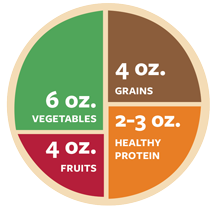The essence of healthy eating is a diet centered on real food balanced with variety. Berkeley Dining’s team is here to support our campus community by offering the options, flexibility, and resources you need to keep you nourished while at Cal!
Eat Well at Berkeley Dining
The abundance of choices in an all-you-can-eat dining commons can add complexity to healthy eating. Here are six friendly tips from Berkeley Dining to keep you on track:
- Small portions, with variety. This doesn’t mean you must eat everything your dining commons has to offer every day. Try out new Berkeley Dining locations, platforms, dishes, and offerings over the course of, say, a week. The more varied your food intake is, the more likely that your nutrient intake is balanced and complete. You just may discover new favorites in the process!
- Fruits and veggies, please. Always make room on your plate for vegetables, cooked or raw, in sides or entrées. Learn to love them for their color, flavor, crunch, and yes, the loaded nutrients! Handheld fruits are offered throughout the day in the dining commons, so feel free to take one on your way out for a snack later.
- Try whole grains, if you haven’t. Whole grains, including brown rice, whole wheat bread, and whole wheat pasta, are typically found in the dining commons as alternatives to white rice, white bread, and regular pasta. Whole grains deliver more nutrients to your body in the same serving and will satisfy you longer.
- Water for thirst. Water and noncaloric carbonated water are offered in the dining commons throughout the day. Soda, lemonade, fruit drinks, and other sugar-sweetened beverages have added sugar and will sneak calories in without you even noticing.
- Lean protein, less processed meats. Berkeley Dining takes pride in the lean protein we offer every day, including fish, beef, turkey, chicken, and seafood, as well as plant-based protein, such as tofu, quinoa, beans, and lentils. Put these on your plate more often. Set a limit for yourself on processed meats, including bacon, sausage, hot dogs, and cold cuts.
- Slow down when sitting down. Cultivate your food smartness by slowing down to enjoy the taste and textures, and paying attention to how you feel. Eating mindfully gives you a chance to reflect on your diet and learn what works for your body and what doesn’t.
Berkeley Dining Nutrition Highlights
- All Berkeley Dining locations feature a nutritionally balanced menu that supports the healthy eating plate.
- We source sustainable products when possible, including foods that are locally grown, humanely-treated and environmentally and socially responsible. Please visit the sustainability section of our site for more information about our sustainable and nutritious food sourcing practices.
- We minimize the use of trans-fat containing products with the goal of eliminating trans fat from Berkeley Dining.
- Berkeley Dining offers better-for-you whole grain alternatives, such as whole wheat breads, brown rice, and whole wheat pasta in addition to white breads, white rice, and regular pasta.
- All locations offer vegan and vegetarians options at all times.
- All dining commons offer milk alternatives, including soy and almond milk.
- For best hydration without added sugar, fill your glass with water, sparkling water, or infused water located in all dining commons.
Fill Your Healthy Eating Plate

6 oz vegetables, 4 oz grains, 4 oz fruits, 2-3 oz healthy protein
- The more veggies — and the greater the variety — the better. Potatoes and french fries don’t count.
- Eat a variety of whole grains like oatmeal, whole-wheat bread or pasta, or brown rice. Feeling adventurous? Try these grains on our menu including quinoa, millet, farro, barley, black and red rice, and amaranth!
- Choose fish, poultry, beans, and nuts. Limit red meats and cheese; avoid bacon, cold cuts, and other processed meats.
- Eat plenty of fruits of all colors. They are great as snacks on the go.
- Drink water, tea, or coffee with little or no sugar. Avoid beverages with added sugar.
- Use healthy oils like olive oil at the salad bar. Berkeley Dining is proud of our efforts to eliminate partially hydrogenated oil or trans-fat from our menu.
* Adapted from Healthy Eating Plate created by Harvard T.H. Chan School of Public Health, Copyright © 2011, Harvard University
Nutrition Information
Reach out to our staff Dietitian Jaylene Tang by emailing dietitian@berkeley.edu if you have questions about the nutritional profile of menu items, want to improve your diet while on a meal plan, or just have a general nutrition or wellness related question